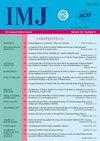脂肪组织和脂肪因子在代谢综合征慢性炎症发展中的作用
Q4 Medicine
引用次数: 1
摘要
将肥胖与胰岛素抵抗结合起来的最紧迫的问题是慢性亚临床炎症,它影响脂肪组织的代谢和分泌功能,对病理过程的发展至关重要。炎症的形态学基础是免疫活性细胞对脂肪组织的浸润。脂肪组织特有的生物活性物质被认为是在脂肪细胞中分泌的类胶原蛋白脂联素和蛋白质激素瘦素。瘦素刺激细胞免疫反应,增加促炎细胞因子的产生,脂联素被认为具有抗炎特性。随着代谢综合征的发展,血脂联素浓度降低,瘦素浓度升高。为了确定血清瘦素水平与全身炎症标志物、促炎细胞因子自发产生以及单核血白细胞之间的关系,我们进行了一项实验研究,即在5 - 6月龄的白色雌性大鼠WAG / GSto中建立代谢综合征模型。促炎细胞因子的优势:白细胞介素- 1β, - 6, - 8, - 10, TNF - α在单核白细胞的上清液中随着瘦素浓度的增加,这与其刺激细胞免疫和影响促炎细胞因子产生的能力的观点是一致的。研究证明,代谢综合征中瘦素水平升高不仅是表征脂肪组织功能状态的一种症状,而且引起血液中自发产生促炎细胞因子和单核白细胞,与全身炎症反应具有病理相关性。在肥胖的背景下,血清中细胞因子谱的变化可以预测代谢综合征的形成和治疗效果。关键词:肥胖,代谢综合征,未分化慢性炎症,细胞因子。本文章由计算机程序翻译,如有差异,请以英文原文为准。
ROLE OF ADIPOSE TISSUE AND ADIPOKINES IN CHRONIC INFLAMMATION DEVELOPMENT ON METABOLIC SYNDROME BACKGROUND
The most pressing issue that combines obesity and insulin resistance is chronic subclinical inflammation, which affects the metabolic and secretory functions of adipose tissue, and is important for the development of pathological processes. The morphological basis of inflammation is the infiltration of adipose tissue by immune competent cells. Biologically active substances specific for adipose tissue are considered to be the collagen−like protein adiponectin and the protein hormone leptin, which are secreted in adipocytes. Leptin stimulates the cellular immune response and increases the production of pro−inflammatory cytokines, and adiponectin is thought to have anti−inflammatory properties. With the development of metabolic syndrome, the concentration of adiponectin in blood decreases, and that of leptin increases. To establish the relationship between serum leptin levels with markers of systemic inflammation and spontaneous production of proinflammatory cytokines as well as mononuclear blood leukocytes, an experimental study was conducted, i.e. modeling the metabolic syndrome in white female rats WAG / GSto aged 5−6 months. The predominance of proinflammatory cytokines: interleukins − 1β, −6, −8, −10, TNF−α in supernatants of mononuclear leukocytes with increasing leptin concentration, which is consistent with the view of its ability to stimulate cell immunity and affect the production of proinflammatory cytokines. It is proven that an increase in leptin levels in metabolic syndrome is not only a symptom that characterizes the functional state of adipose tissue, but also causes spontaneous production of proinflammatory cytokines and mononuclear leukocytes in blood, that is pathogenetically interrelated with the systemic inflammatory response. It is established that the change in the cytokine profile in the serum becomes a forecast of the formation and effectiveness of treatment of metabolic syndrome on the background of obesity.
Key words: obesity, metabolic syndrome, undifferentiated chronic inflammation, cytokines.
求助全文
通过发布文献求助,成功后即可免费获取论文全文。
去求助
来源期刊

International Medical Journal
医学-医学:内科
自引率
0.00%
发文量
21
审稿时长
4-8 weeks
期刊介绍:
The International Medical Journal is intended to provide a multidisciplinary forum for the exchange of ideas and information among professionals concerned with medicine and related disciplines in the world. It is recognized that many other disciplines have an important contribution to make in furthering knowledge of the physical life and mental life and the Editors welcome relevant contributions from them.
The Editors and Publishers wish to encourage a dialogue among the experts from different countries whose diverse cultures afford interesting and challenging alternatives to existing theories and practices. Priority will therefore be given to articles which are oriented to an international perspective. The journal will publish reviews of high quality on contemporary issues, significant clinical studies, and conceptual contributions, as well as serve in the rapid dissemination of important and relevant research findings.
The International Medical Journal (IMJ) was first established in 1994.
 求助内容:
求助内容: 应助结果提醒方式:
应助结果提醒方式:


